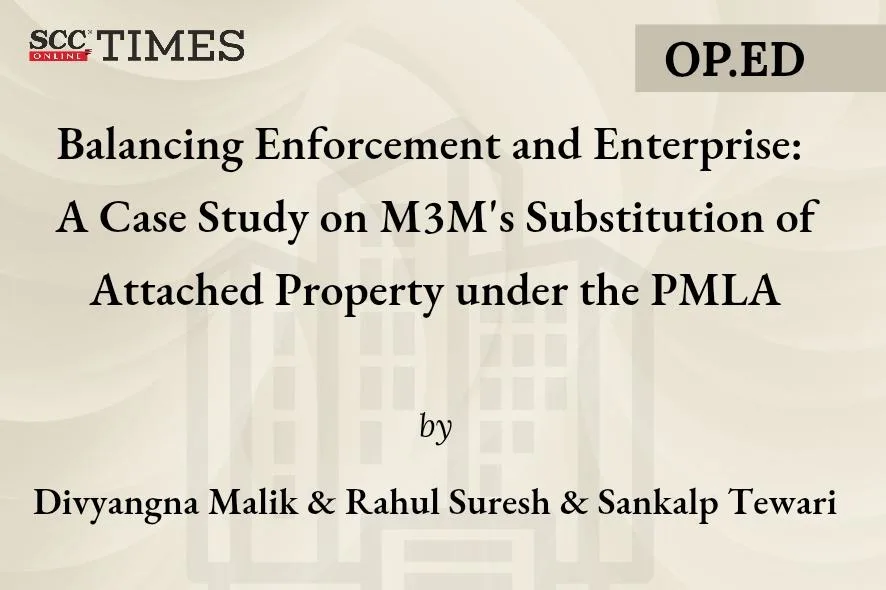In a notable development for both the real estate sector and white-collar jurisprudence, the Supreme Court recently permitted M3M India Pvt. Ltd., one of the largest unlisted player in India, to substitute a provisionally attached property, valued at Rs 317 crores, under proceedings initiated by the Enforcement Directorate (ED) under the Prevention of Money-Laundering Act, 2002 (PMLA)1. This case2, while not setting a binding precedent, marks a meaningful moment in the evolving interface between economic regulation and commercial viability.
The context: Provisional attachment under the PMLA
Section 5 of the PMLA3 empowers the ED to provisionally attach properties suspected of being “proceeds of crime”, even prior to adjudication. This pre-emptive measure, designed to prevent dissipation of illicit gains, often results in attachment of high-value assets such as real estate, assets which may also be central to ongoing commercial projects.
Such attachments, though legally sound, may inadvertently paralyse legitimate business operations, adversely affecting stakeholders like homebuyers, employees and financial institutions. In this case4, M3M had challenged the attachment of a property that formed part of an operational commercial project. Instead, they offered an equivalent value alternative asset to maintain business continuity while safeguarding the ED’s interest.
The Supreme Court’s observations: A pragmatic balance
While the top Court did not issue a ruling of precedential value, it effectively acknowledged a nuanced legal gap, the PMLA neither expressly provides for, nor prohibits, substitution of attached properties. The Court’s permission to allow substitution was conditioned on equivalence in value, transparency of the transaction, and full cooperation with the ongoing investigation.
This measured approach underscores a judicial willingness to interpret the PMLA with a pragmatic lens, one that does not dilute its purpose, but avoids disproportionately punishing entities whose assets are vital for economic operations.
Key legal takeaways
(1) No erosion of ED authority: The Court’s order does not undermine the statutory powers vested in the ED. Instead, it recognises the possibility of balancing enforcement with economic continuity where the risk of dissipation is neutralised.
(2) Substitution as a viable middle path: Although not codified within the PMLA framework, the acceptance of property substitution opens a discussion on whether such mechanisms can be institutionalised, subject to safeguards, for specific industries like infrastructure and real estate.
(3) Commercial realities considered: The judgment reflects a deeper understanding that certain real estate assets, while under investigation, also serve as economic tools that support employment, financing and housing supply chains. Arbitrary freezing of such assets can have downstream consequences beyond the immediate accused.
Implications for the real estate sector
For developers such as M3M builders, the ruling offers a cautious but constructive path forward, particularly in cases where provisional attachments threaten to derail large-scale commercial operations. The order acknowledges that justice, especially in economic offences, must not come at the cost of commercial paralysis.
The decision5 may serve as persuasive authority in similar future disputes, where companies demonstrate bona fide intent and are willing to provide equivalent-value security for attached assets.
Conclusion: Jurisprudence meets economic prudence
The Supreme Court’s decision in the M3M matter6 is emblematic of the Courts’ evolving approach, moving away from blanket punitive application toward a more calibrated, context-sensitive interpretation of enforcement law. It signals that justice must be robust, but not blind to operational realities.
By cautiously permitting property substitution, the Court has created a functional precedent, not in doctrine, but in sensibility. A precedent that may not appear in law reports, but one that echoes in the corridors of compliance, investment and enterprise.
*Principal Associate, Solicitors India Law Offices.
**Senior Associate, Solicitors India Law Offices.
***Associate, Solicitors India Law Offices.
1. Prevention of Money-Laundering Act, 2002.
2. Director v. Eastern Institute for Integrated Learning in Management University, 2025 SCC OnLine SC 1395.
3. Prevention of Money-Laundering Act, 2002, S. 5.
4. Director v. Eastern Institute for Integrated Learning in Management University, 2025 SCC OnLine SC 1395.
5. Director v. Eastern Institute for Integrated Learning in Management University, 2025 SCC OnLine SC 1395.
6. Director v. Eastern Institute for Integrated Learning in Management University, 2025 SCC OnLine SC 1395.


